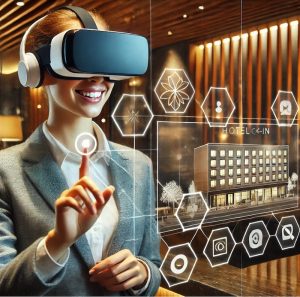
The hospitality industry, driven by exceptional guest experiences, relies on highly trained and customer-focused employees. Virtual Reality (VR) is a powerful tool to enhance training, standardize procedures, accelerate learning, onboarding, orientation and the recruiting processes. It provides immersive learning experiences that prepare staff more effectively and boost engagement. Here’s how VR can transform these areas for hotels and the broader hospitality industry.
- VR in Training: In Real-World Simulated Scenarios
Training hotel staff to handle a variety of situations—whether front desk management, housekeeping, or guest relations—can be challenging in traditional settings. VR allows new hires to experience these scenarios in a risk-free, immersive environment, where they can learn to respond to guest needs and solve issues before they encounter them on the job. By simulating real-world scenarios, VR enables employees to practice handling common issues, like difficult customer interactions or emergency procedures, in a way that feels authentic but carries no real-world risks.
Companies have adopted VR to train new employees in various operational roles, resulting in higher knowledge retention and improved performance. According to a PwC study, employees trained in VR can learn faster and more effectively than in traditional classroom settings, as VR engages learners through immersive, hands-on experiences.
- VR for Onboarding: Immersive Hotel Orientation
Onboarding in the hospitality sector involves introducing new employees to brand standards, procedures, and workplace culture, often requiring extensive training periods. VR provides new hires with a comprehensive virtual tour of the hotel, helping them familiarize themselves with the layout, amenities, and service expectations without disrupting regular operations.
Through VR, new hires can complete virtual walkthroughs of guest rooms, back-of-house areas, and front desk operations, which reduces the need for in-person training time and accelerates the onboarding process. This approach not only saves time but also ensures that all employees receive a consistent, standardized orientation.
- VR in Recruiting: Showcasing Workplace Culture and Job Roles
Recruiting in the hospitality industry can be competitive, with high turnover rates making it essential to attract and retain talent effectively. VR can play a pivotal role by allowing potential employees to experience “a day in the life” of various roles within the hotel. Candidates can virtually shadow employees in roles like concierge, kitchen staff, or event management, gaining insights into the hotel’s work environment and culture.
For example, VR can give prospective employees a glimpse into what it’s like to work in hospitality, from front desk responsibilities to culinary tasks. This transparent approach helps candidates make informed decisions, reducing turnover by aligning expectations with job realities.
Conclusion
For the hospitality industry, VR represents an innovative solution to common training, onboarding, orientation and recruitment challenges. Hotels can save time, reduce costs, and improve employee performance by integrating VR into their processes.
By creating immersive experiences that mirror real-life situations, hotels can ensure their staff are well-prepared, culturally aligned, and confident from day one. With VR technology, hotels of all sizes can leverage this powerful tool to elevate their operations and deliver outstanding guest experiences.
For more information in how BigLook360 can help your organization leverage VR for training more effectively, contact us by clicking below or emailing: contact@biglook360.com
